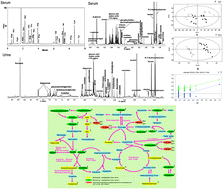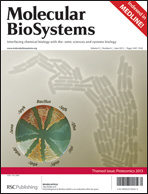Metabolomic investigation of Arthus reaction in a rat model using proton nuclear magnetic resonance (1H NMR) spectroscopy and rapid resolution liquid chromatography (RRLC)†
Abstract
Arthus reaction (AR), a type of unconventional immune complex-mediated inflammation, is likely accompanied by alterations in circulating metabolites. Here, a proton nuclear magnetic resonance (1H NMR) spectroscopy method coupled with a rapid resolution liquid chromatography (RRLC) method was developed to evaluate the systemic metabolic consequences of AR and characterize metabolic aberrations. Serum and urine samples from AR rats and normal controls were compared to determine whether there were significant alterations associated with AR. The partial least squares discriminant analysis (PLS-DA) models of metabolomic results demonstrated good intergroup separations between AR rats and normal controls. Multivariate statistical analysis revealed significant alterations in the levels of 34 metabolites, which were termed as the disease-associated biomarkers. Differential metabolites identified from the metabolomic analysis suggested that AR caused dysfunctions of kidney and liver accompanied with changes in widespread metabolic pathways including the tricarboxylic acid (TCA) cycle, gut microbiota metabolism, lipids and cell membranes metabolism, glucose metabolism, fatty acid β-oxidation, amino acids metabolism and ketogenesis. This study assessed and provided important metabolomic variations in serum and urine associated with AR and, therefore, demonstrated metabolomics as a powerful approach for the complete elucidation of the underlying pathophysiologic mechanisms of AR.


 Please wait while we load your content...
Please wait while we load your content...